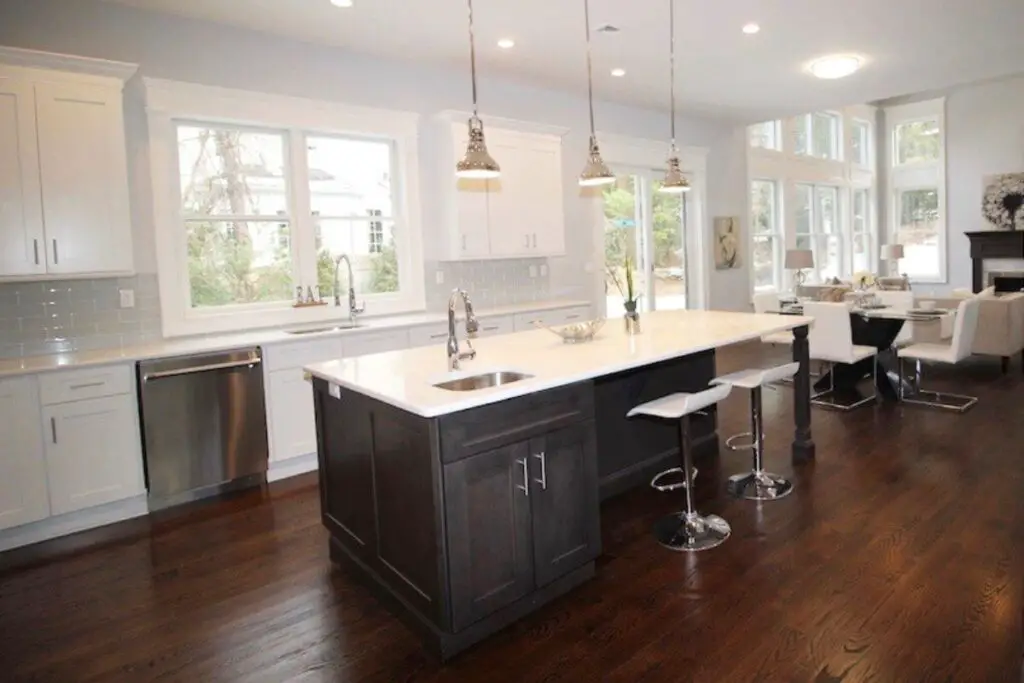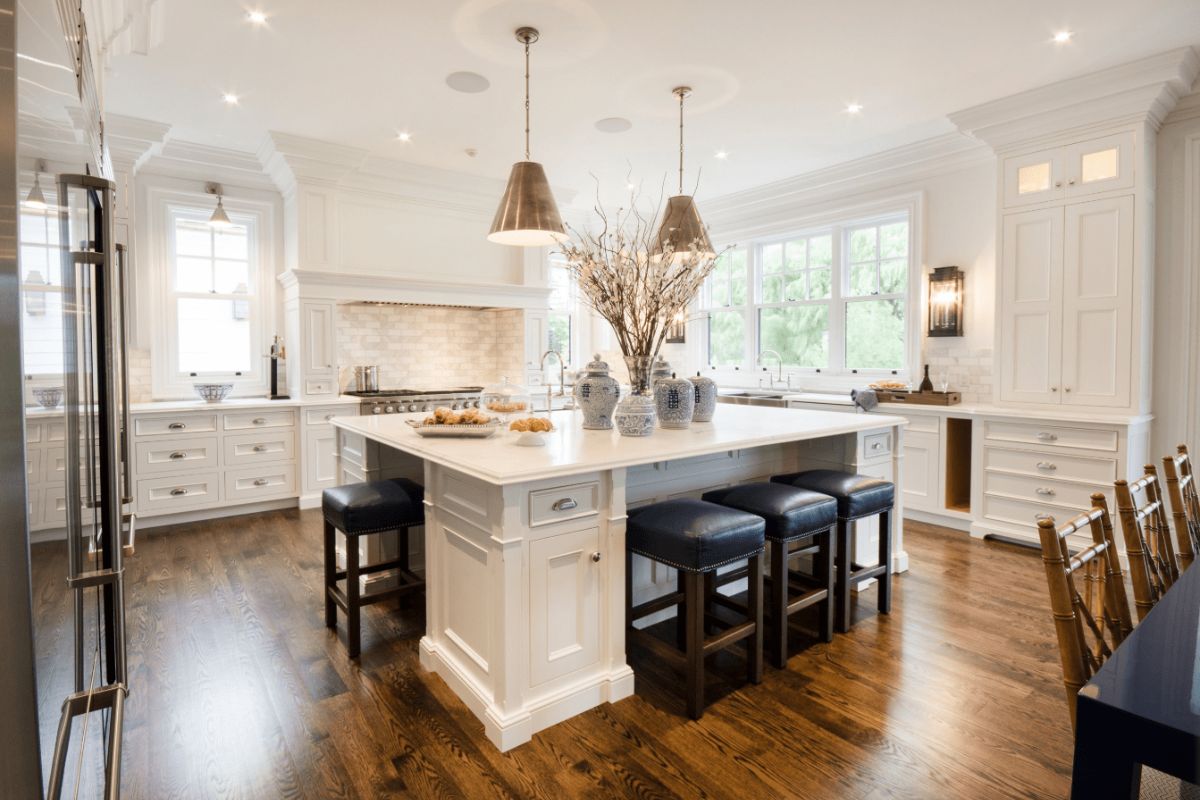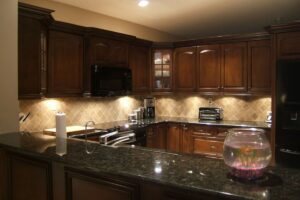When it comes to kitchen flooring, one of the most critical decisions you’ll make is choosing between hardwood and tile. Both options offer unique advantages and aesthetic qualities, but they also come with their own set of considerations. In this article, we will thoroughly compare kitchen hardwood and tile flooring, helping you make an informed choice for your culinary space.
Introduction
The kitchen is the heart of your home, and the choice of flooring can significantly impact its functionality and appearance. Let’s explore the key features of both kitchen hardwood and tile flooring to assist you in making the best decision for your needs.
Kitchen Hardwood Flooring
Advantages
1. Warmth and Aesthetic Appeal
- Hardwood flooring adds a timeless and warm ambiance to your kitchen. It creates a cozy atmosphere that many homeowners love.

2. Durability
- High-quality hardwood floors can withstand years of wear and tear. They are known for their longevity and ability to age gracefully.
3. Comfort
- Hardwood provides a comfortable surface to stand on while cooking, making it easier on your feet and back.
Considerations
1. Vulnerability to Moisture
- Hardwood is susceptible to water damage. Spills and leaks must be promptly cleaned to prevent warping or staining.
2. Maintenance
- Regular maintenance, such as refinishing and sealing, is required to keep hardwood floors in top condition.
Tile Flooring
Advantages
1. Water Resistance
- Tile is highly resistant to water, making it an ideal choice for areas prone to spills and moisture, such as the kitchen.
2. Easy Cleaning
- Tiles are easy to clean and maintain. Spills and stains can be wiped away effortlessly.
3. Variety of Styles
- Tiles come in a wide range of styles, colors, and patterns, allowing you to achieve the desired look for your kitchen.
Considerations
1. Cold and Hard Surface
- Tile can feel cold and hard underfoot, which may not be as comfortable for extended periods of cooking or standing.
2. Grout Cleaning
- The grout between tiles can be challenging to clean and may require periodic maintenance to prevent discoloration.
Which One is Right for Your Kitchen?
The choice between kitchen hardwood and tile flooring depends on your priorities and preferences:
- Choose Hardwood If:
- You prioritize warmth and a classic aesthetic.
- Comfort and resilience underfoot are essential to you.
- You are willing to invest in regular maintenance to keep your floors looking pristine.
- Choose Tile If:
- Water resistance and ease of cleaning are top priorities.
- You prefer a wide variety of style options.
- You want a low-maintenance flooring option that can withstand spills and moisture.
Consider your lifestyle, budget, and design preferences when making your decision.
Conclusion
Ultimately, the choice between kitchen hardwood and tile flooring is a matter of personal preference and practicality. Both options have their advantages and considerations, so it’s crucial to weigh them carefully before making your decision. Your kitchen flooring should complement your lifestyle and enhance the overall functionality and beauty of your culinary space.
FAQs
Can hardwood floors be used in kitchens with heavy foot traffic?
Yes, hardwood floors are suitable for kitchens with heavy foot traffic, but it’s essential to choose a durable hardwood species and maintain them regularly.
Are there waterproof hardwood flooring options available for kitchens?
Some engineered hardwood floors are designed to be more water-resistant than traditional hardwood, but they still require diligent maintenance.
Can tile flooring be installed over existing kitchen flooring?
In many cases, tile can be installed over existing flooring, but it’s essential to consult with a professional to ensure a proper installation.
What is the approximate lifespan of tile flooring in a kitchen?
With proper care, tile flooring can last for several decades, making it a long-lasting choice for your kitchen.
Is underfloor heating compatible with both hardwood and tile flooring?
Yes, underfloor heating can be installed under both hardwood and tile flooring to provide additional comfort and warmth.
Which flooring option is more budget-friendly: hardwood or tile?
Generally, tile flooring tends to be more budget-friendly upfront, but hardwood can offer better long-term value due to its durability and timeless appeal.
Can hardwood flooring be refinished to change its appearance?
Yes, one of the advantages of hardwood flooring is that it can be sanded and refinished multiple times to change its color or finish, providing versatility in design.
Does the choice of flooring affect the resale value of a home?
Both hardwood and tile flooring can positively impact the resale value of a home. Potential buyers often appreciate these durable and attractive flooring options.
What are the best practices for maintaining tile grout to prevent discoloration?
To maintain tile grout, regularly clean it with a pH-neutral cleaner, and consider applying a grout sealer to prevent staining and discoloration.
Can I install radiant heating under tile flooring to address its coldness?
Yes, radiant floor heating can be installed under tile flooring to provide warmth, making the surface more comfortable, especially during colder seasons.
Are there eco-friendly options available for both hardwood and tile flooring?
Yes, you can find eco-friendly options for both. Look for sustainable hardwood options, such as reclaimed wood, and choose tiles made from recycled materials or those certified as environmentally friendly.
How can I protect hardwood floors from kitchen spills and water damage?
To protect hardwood floors in the kitchen, use area rugs in high-spill areas, promptly wipe up spills, and consider placing mats near sinks and dishwashers to catch excess water.
Can I install either hardwood or tile flooring myself, or should I hire a professional?
While DIY installation is possible for both options, hiring a professional is often recommended, especially if you’re not experienced in flooring installation, to ensure proper alignment and durability.
Which flooring option is more resistant to scratches and dents caused by heavy kitchen appliances?
Hardwood floors can be susceptible to scratches from heavy appliances, so it’s essential to use furniture pads or appliance glides to protect the surface. Tile is generally more resistant to such damage.
Can I mix and match hardwood and tile flooring in my kitchen for a unique look?
Yes, you can combine hardwood and tile flooring to create distinct zones or patterns in your kitchen, adding a unique touch to your design.
Remember that your choice of kitchen flooring should align with your preferences, lifestyle, and practical needs. Consider consulting with flooring professionals for personalized guidance based on your specific kitchen space.



